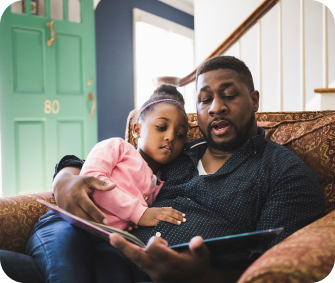
Sharing your cancer diagnosis
You don’t need to go through a cancer diagnosis alone. Learn ways to share information about your cancer diagnosis with loved ones, friends, and coworkers.
Talking about cancer when you’re ready
A cancer diagnosis can be very difficult, and you may feel unsure when and how to talk about it with others. You get to decide if, when, and how much you share about your diagnosis. You may want to take time to process your feelings before you’re ready to talk about cancer. Or, you may want to reach out to people right away. Either of these responses is OK.
If and when you are ready to share, here are some ways to get through that process.
How do I share my cancer diagnosis?
Sharing with loved ones and friends
When you do feel ready to share your cancer diagnosis with loved ones or friends, make sure you’re sharing with the right person at the right time. Here are some tips for choosing who to talk to and when:

- Choose someone who is a good listener. Choose a person who will listen, understand, offer support, and help you feel seen and heard
- Find a good time to talk. Make sure it’s a time of day when you feel ready to share
- Expect emotions. You might begin to feel strong emotions, which could include anger or fear. Allow those feelings to come and know they are normal responses to your situation
- Define boundaries. Be clear about the type of support you want and from whom. You can also set boundaries for any support you don’t want, such as no in-person visits if you’re feeling tired
Sharing with children
Here are some tips for sharing your diagnosis with a child. You know your child best, and it’s important to think about their age, developmental stage, and maturity level. You may want to keep things simpler for a younger child, and give more context for an older or more mature child.
- Make a plan with your parenting partner so you’ll feel ready for the conversation
- Find a good time when everyone is available and ready to listen, such as during or after a shared meal
- Be as clear and simple as possible, avoiding unnecessary details
- Talk about the process, including what they can expect in day-to-day life and who is on your care team
- Be open to their questions and feelings, and give them the time to process and react the way they need to
- Use your support resources, including online support or books

Sharing with your employer or coworkers
Sharing with your employer or coworkers is a little different from sharing with your close family or friends. You may not want to share as much, or you may choose not to share at all. Whatever you decide is completely up to you. If you do want to share with a coworker, here are some things to keep in mind:
- Share your diagnosis with a trusted coworker first. They can help you make a plan for telling more people if you want to
- Reach out to your HR team, who can help you understand your company’s leave policy if you need to take time off work
- Decide what you want to share, with whom, when, and in how much detail. Don’t be afraid to tell someone “I’d rather not talk about that” if a question makes you uncomfortable or you’re just not ready to talk about it


How will my diagnosis impact my work life?
Cancer can have a big impact on your work life, but there are ways you can take back a sense of control over your situation. Find ways to help balance your work life while living with cancer.
What resources can help me share my cancer diagnosis?
Online support
Here are some resources to help you share your diagnosis with people in your life:
- CaringBridge is a website that connects caregivers with a supportive community and offers tools for people going through health difficulties to share their health journey
- American Cancer Society offers a variety of tools and resources for those facing cancer and their loved ones, including a mobile app
- Facebook support groups are just a few clicks away. You may be able to find a group that is local to your city or town

Helpful books and podcasts
Check your local library, book store, or online for recommended books and podcasts to help you through conversations with loved ones.
You can also ask others you know who have been through a cancer diagnosis if they have any recommended books or podcasts that helped them share their diagnosis.

Where can I find more cancer support?
Access resources that may help you during a cancer diagnosis, including how to find financial support, local childcare, transportation services, and other important resources.
US-KEY-08159 09/24




